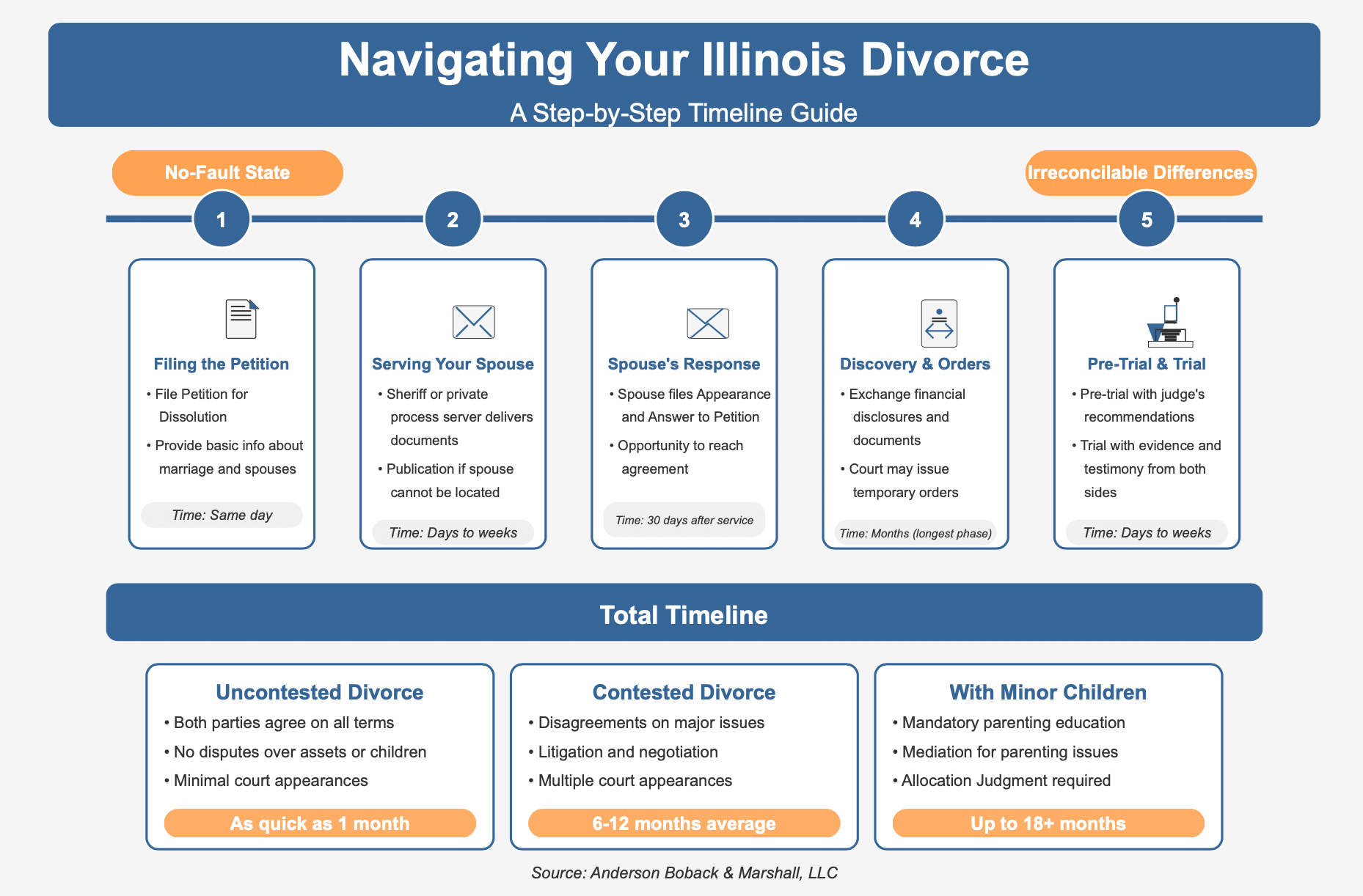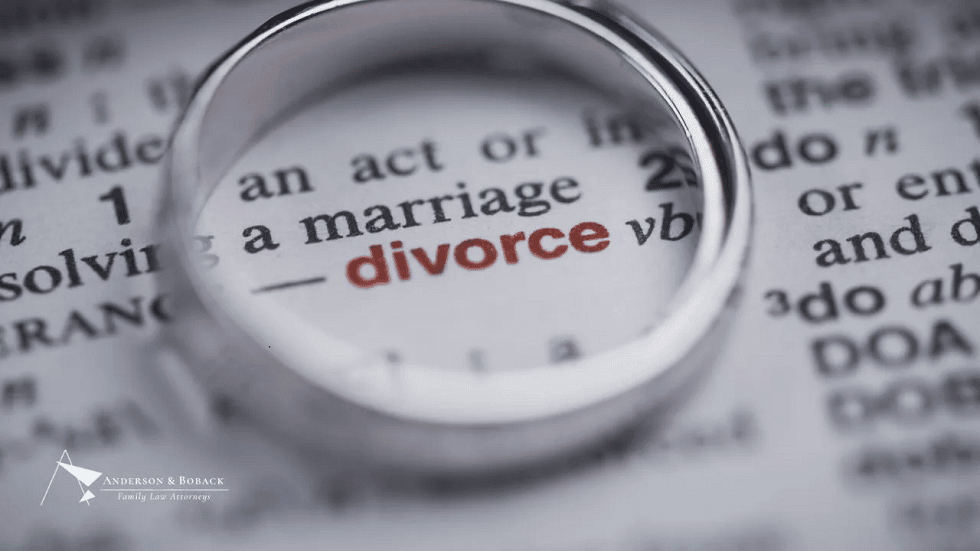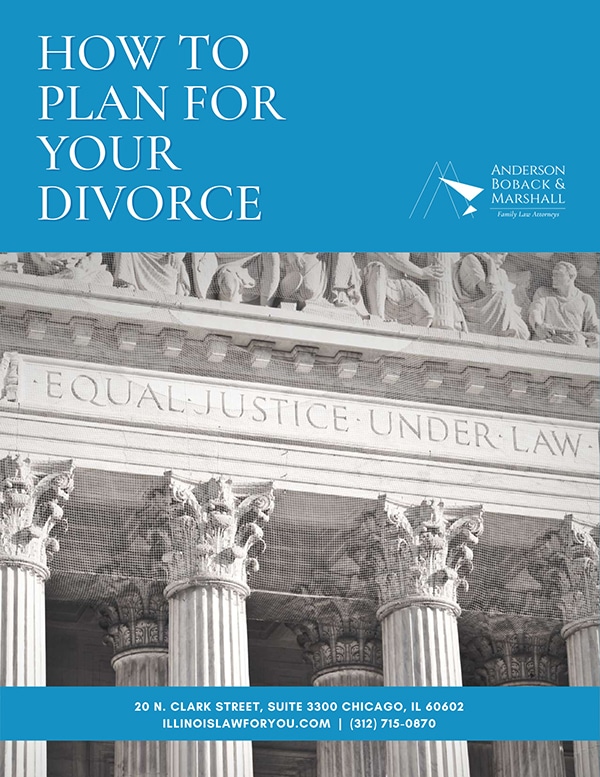In the Illinois divorce process, either spouse can file for dissolution of marriage because the state follows a “no-fault” system. As Chicago divorce lawyers a term we hear often, especially in celebrity divorces, is “Irreconcilable Differences.” This term means that the court is generally not interested in who did what. The court is interested, however, in knowing if the marriage can be saved.
For a court to issue a judgment of dissolution of marriage, it must find that your marriage has irretrievably broken down. The court must also find that previous attempts to save the marriage have failed. Furthermore, it must determine that any future efforts to repair the marriage would not succeed. In fact, any future attempt would actually be against the best interests of your family.
In the Illinois divorce process, the law presumes irreconcilable differences if both parties have lived separately and continuously for at least six months.
How Long is the Illinois Divorce Process?
STEP 1: Filing the Petition for Dissolution of Marriage with The Court
One of the biggest deciding factors in how long your divorce will take comes down to the initial filing of the petition. In your Petition, you give the court the basic information about you, your spouse and your marriage. How old are you both? Where do you live? When did you get married? Are there minor children from the marriage?
What I mean about that is how are you filing the petition? Did you discuss the divorce ahead of time with your spouse or is it going to be a shock when they receive the papers? If it is possible, it is always good to try to sort through as many issues as possible prior to filing the paperwork for a dissolution of marriage.
Then you will know from the start what issues are agreed to and what issues remain “contested” or disputed. This is critical in determining how long the divorce process will take for you.
If you come to the realization that both you and your spouse are on board to get the divorce and you agree to all terms of the divorce, then your Illinois divorce process timeframe from Point A (filing for divorce) to Point B (having a judgment entered dissolving your marriage) is significantly reduced.
It generally comes down to the time involved to draft the necessary documents and the court’s schedule to get you in. It is not unheard of to hear that someone’s divorce was finalized within a month from the date they filed. That usually means that the parties waited to file the petition until they finalized their agreement in writing. This is usually the most cost-effective practice.

STEP 2: Serving Your Spouse with The Petition for Dissolution of Marriage and the Summons for them to Appear and Answer
For whatever reason, let’s say that you have filed your petition with the court, but you have no agreement with your spouse, maybe they do not even know that you filed. You must serve your spouse with the petition for dissolution of marriage if you want to move forward.
Typically, the County Sheriff will serve the Petition and Summons for you – after you pay a fee, of course. You can also ask the court to give you permission to serve your spouse by using a private process server. The latter is usually fastest. Either way, obtaining service on your spouse usually starts to add time to the clock. Not the court’s clock but your own personal clock. The court will not move forward until your spouse has been served, so you can see why discussing the divorce ahead of time could, potentially, save you some time. There are situations where service can be obtained in another manner, such as publication.
STEP 3: Your Spouse Must File Their Appearance and They Are Given Time to File an Answer to Your Petition for Dissolution
Once your spouse is served, they will have time to file their own appearance in the matter. They will also be given an opportunity to respond to your petition by filing an Answer to the Petition for Dissolution of Marriage. This could possibly be another opportunity to see if the two of you can come to an agreement. If not, you must continue on. Remember that if there are minor children involved, you and your spouse may be ordered to attend mediation to resolve the child-related issues.
STEP 4: Litigation, Discovery and Temporary Orders
If you and your spouse have disagreements regarding how to finalize the divorce, then you will likely begin the true litigation process, and this is usually where time starts adding up. To start, if there are disagreements about finances, then you will both need to exchange a financial disclosure.
This is a somewhat basic exchange of information where you disclose your assets, debts, income, etc. You must provide some sort of support to this document. That can be accomplished by providing tax returns, paycheck stubs, bank statements, etc.
To continue building your case for trial, this is the time when you start asking questions and requesting additional documents. This is the “discovery” phase. This is a crucial part of the Illinois divorce process, and it can be time-consuming.
During this time, the parties might petition the court for different kinds of temporary relief. For example, if you are no longer living together then the court might enter a temporary order for child support or maintenance.
This will all depend on the facts of your case, as each case presents a unique set of facts for the court to consider. When petitions and motions are filed, the other party usually has some sort of time to respond to what was filed. Eventually, there will be a hearing regarding the document that was filed, if no agreement can be reached.
As you can imagine, this part of the divorce process takes time and there tend to be multiple court appearances during this time. This makes it difficult to answer the question of “how long does it take to get a divorce”?
STEP 5: Pre-trial
The pre-trial phase of the divorce process is when the Judge gives a recommendation on how to resolve the outstanding issues between the parties. If both parties are represented by attorneys, the pretrial is often held in the Judge’s chambers between the Judge and the attorneys only. This is another opportunity to reach a settlement without the added expenses and time of going to trial.
Step 6: Trial
A trial is the last step in the divorce process Illinois. If you were unsuccessful coming to an agreement with your spouse, then at the trial the Judge will be presented evidence from both sides. The Judge will also hear testimony from witnesses. Sometimes the only testimony comes from the parties themselves, but there can be an assortment of witnesses. If someone claims to have a disability, for example, you may have a doctor as a witness.
During trial you and your witnesses will be asked questions by your attorney and by opposing counsel. Your spouse also has an opportunity to call their own witnesses. A trial could last half a day or could be set for multiple days.
It is not uncommon to hear of a trial having one day of testimony and then another day of testimony a month later. Most courts have a heavy call, which means that they hear multiple cases each day. If a trial lasts longer than expected, the Judge may not be able to resolve the case on that scheduled day.
Take Away
Sometimes the length of the Illinois divorce process simply comes down to how well you and your soon-to-be ex-spouse communicate. Understandably, it is very difficult to set emotions aside in a divorce, but try to remember that the Court is only there to decide legal issues and if you cannot come to an agreement then the Court will decide for you at trial.
Once you get to trial, you are no longer in control and it comes down to the facts as the Judge sees them. Some people are fine with leaving the final decision to the Judge, but many others would prefer to have more of a say in the outcome.
When you are wondering how long it takes to get a divorce, contact the experienced family law attorneys at Anderson Boback & Marshall for guidance throughout the entire divorce process Illinois.

Frequently Asked Questions About the Divorce Process in Illinois
Whether you’re just starting to think about divorce or ready to take action, you may have questions about how the process works in Illinois. The answers below address common concerns and aim to give you clarity and confidence.
I want to get divorced. Do I need my spouse’s permission?
No. In Illinois, you do not need your spouse’s permission to get a divorce. The only requirement is to show irreconcilable differences and that you’ve lived separately for at least six months. You no longer need to prove fault. That said, if your spouse agrees to cooperate, the process can often move more quickly and smoothly.
What should I do first if I want to get a divorce?
The first and most important step is hiring an experienced divorce attorney. Divorce law is highly nuanced, and having a lawyer who focuses exclusively on family law ensures that you’re represented by someone who knows the judges, procedures, and legal landscape inside and out. Avoid general practitioners—your best outcome depends on an attorney who works in divorce court every day.
What will my divorce attorney do first?
Your attorney will begin by exploring opportunities to resolve matters amicably. We aim to settle as many issues as possible upfront to save you time and money. You’ll be involved in developing a legal strategy based on your rights, the likely outcomes in court, and your goals.
Once we define the legal direction, we will prepare and file the Petition for Dissolution. If your spouse agrees to accept service voluntarily, it can make the process more efficient. This cooperation also helps the attorneys begin early discussions on important matters.
How do children affect divorce proceedings in Illinois?
When children are involved, Illinois courts require both parents to complete a parenting education program. They must also take part in mediation to resolve custody and parenting time. If the parents cannot reach an agreement, the court may appoint a Guardian ad Litem or Child Representative to advocate for the child’s best interests. Parenting matters are handled first through an Allocation Judgment. Only after that does the court move on to financial issues.
What happens if mediation is unsuccessful?
If mediation doesn’t lead to an agreement, the court may appoint a Guardian ad Litem (GAL) or a Child Representative. These individuals act in the best interest of the child—not either parent. Their input can strongly influence the court’s decisions. You should talk to your divorce attorney ahead of time. This will help you understand what to expect and how to prepare for meetings with the GAL.
What is an Allocation Judgment, and why is it important?
Before addressing financial matters, the court wants to finalize parenting arrangements through what’s called an Allocation Judgment. Formerly known as custody agreements, Allocation Judgments define:
- Parenting time (daily schedule)
- Holiday schedules
- Decision-making responsibilities
The court will address parenting issues first. Only after those are resolved will it move on to dividing assets, addressing support, and finalizing the divorce.
How long does it take to get a divorce in Chicago?
It varies. The Illinois Supreme Court sets an 18-month target for completing Allocation Judgments involving children, but high-conflict cases or those requiring expert evaluations can take longer. For divorces without children or with fewer contested issues, the timeline may be significantly shorter.
















